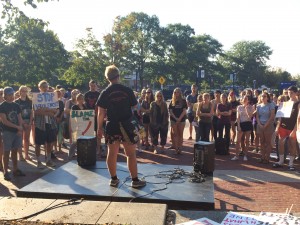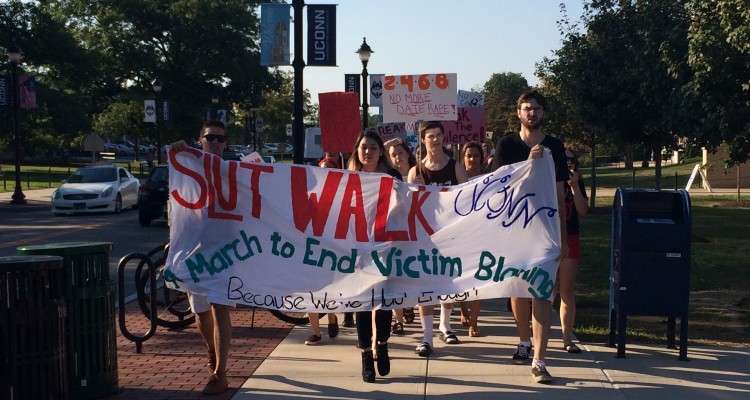Listen to the story below.
By John Ewen
Students at the University of Connecticut marched along Fairfield Way on Friday, chanting messages and carrying signs in a rally to end victim blaming in sexual assault cases.
The event was called SlutWalk: The March to End Victim Blaming, and was hosted by UConn Revolution Against Rape.
“SlutWalk actually originated in Toronto back in 2011, and then made it’s way to UConn that same year and has been going on annually ever since,” said Jill Metzger, Vice President of UConn RAR and one of the event’s coordinators.
“We first start out with a march around campus, where we go down Fairfield Way, and loop back around to the Union where we say these chants and it’s a very powerful time where you get really into it,” she said.
This year’s march received over 380 RSVP’s on Facebook. According to Metzger, last year’s turnout was the biggest it had ever been, with an estimated 200 people coming to support the cause.
SlutWalk began in 2011 following comments made by a Toronto police officer while speaking at Osgoode Hall Law School. The officer said, “women should avoid dressing like sluts in order not to be victimized.”
Following the officer’s comments, activists Sonya Barnett and Heather Jarvis created the event in an effort to reclaim the word “slut” and help end victim blaming.
For some, the positive response and turnout to previous SlutWalks shows progress in the right direction.
“With the previous experiences I’ve seen, people would be sexually assaulted, and no one actually seemed to really care,” said Will Hessert, a sophomore who was at the event for a second year. “So this is the first time I saw there are actually people who care about combatting this issue, which made me feel like there was a little more hope in the world than I had originally thought.”
The event began with opening words from student Lauren Colburn, who gave the crowd a rundown on the history of the SlutWalk campaign. Afterwards, the crowd began their march across campus.
After the march and some words from counselors at UConn’s Counseling and Mental Health Services and the Sexual Assault Crisis Center of Eastern

A student at the University of Connecticut tells the crowd at SlutWalk 2015 her story. Image Credit: John Ewen / WHUS
Connecticut, numerous participants stepped forward and told stories of being sexually assaulted by family members and coworkers. Others shared what they’ve seen family members and friends go through.
Metzger spoke about how she was unable to tell her father about the abuse she suffered.
“By silencing my story, you have silence my healing process,” she said. “You have no idea about the pain I have gone through, the time’s I’ve wondered if the pain would ever stop, and my attempt to make all the pain go away about 11 months ago.”
Junior Casey Healey, President of UConn RAR, has been involved with the organization since her second semester as a freshman. She said that each year’s turnout has been filled with brave participants willing to shed light on their dark times.
”I really am always just so surprised at the power and the strength that so many people have coming up and sharing their stories that are so intimate and so personal, and people are so strong for being able to do that,” Healey said.
While some showed up to tell their stories, others came to show their support. Junior Stephanie Cohen said she hopes SlutWalk can provide assault victims an open and safe forum.
“To know that they can speak out, that there will be people there to listen,” said Cohen. “Judging by the crowd that this gets every year, people will absolutely listen and be a shoulder to lean on.”
For Healey, her goal was to show everyone that no matter what they’ve gone through, people are here to listen and help.
“I know that a lot of people who attend the event are victims or victim survivors or they’re friends, relatives, things like that of victim survivors,” Healey said. “I think that we just want them to take away that they’re not alone and that they have this huge support network.”


